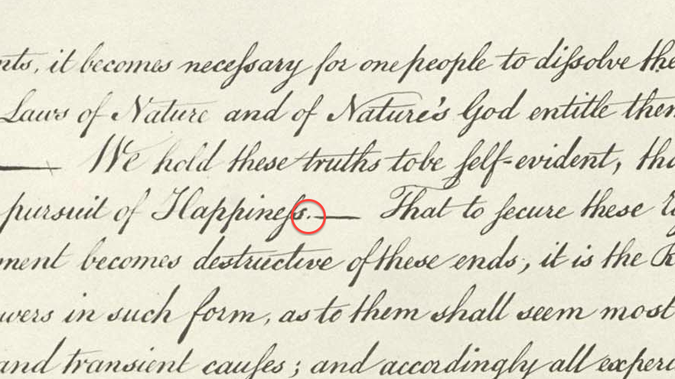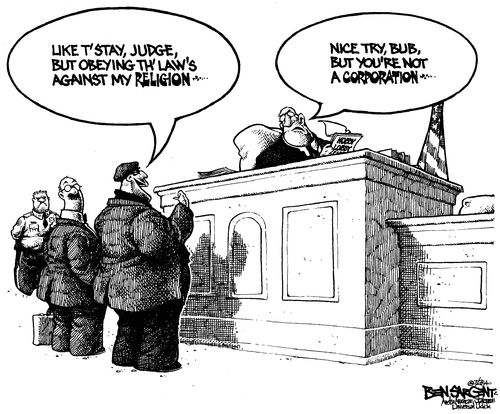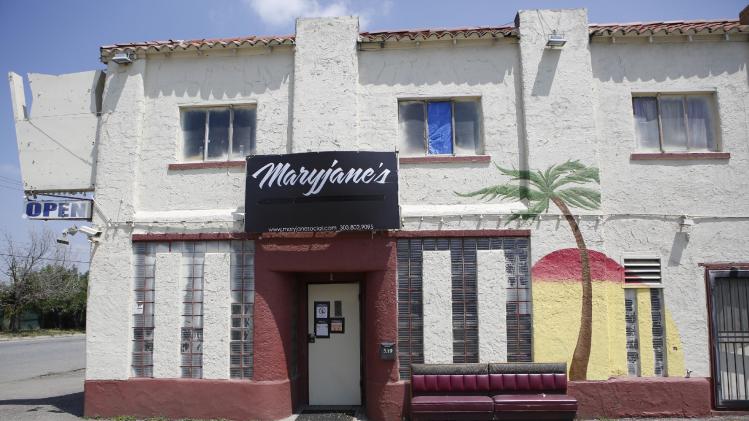We are under siege this July Fourth. We can only resist with
our love of liberty, for it is liberty that is the beating heart of
liberalism…
The Fourth of July is supposed to be a time of celebration for
Americans, a celebration of not only our independence from Great Britain
(when news of the Declaration of Independence’s signing reached George
Washington, he was entrenched in New York City, awaiting the British
assault with an army that was uncertain what it was fighting for), but
for what we hold so dear today, the Declaration’s assertion of
individual rights, that all men are created equal.
Abraham Lincoln wrote a paean of praise to the Declaration’s author in 1859:
All honor to Jefferson –
to the man who, in the concrete pressure of a struggle for national
independence by a single people, had the coolness, forecaste, and
capacity to introduce into a merely revolutionary document, an abstract
truth, and so to embalm it there, that today and in all coming days, it
shall be a rebuke and a stumbling block to the very harbingers of
reappearing tyranny and oppression.
Whether Jefferson knew what he was doing when he
inserted the abstract truth of the preamble (and debate continues),
today we are left to think, “if only the Constitution were a stumbling
block.” It has proven to be anything but to wingnut demagogues, who
praise it while trampling it underfoot.
The Fourth has become instead a time of mourning. Good news
is hard to come by in this late afternoon of empire and more precious
than gold. If you thought the War on Women was bad previously, it has
gotten much, much worse. The Supreme Court has decided in contravention
of the Constitution that not only are all of us not equal –
namely women – but that NONE of us are equal to a corporation, an
obscene concept that never occurred to the Founding Fathers.
As we go through the Fourth of July weekend, we are
told we should thank Ted Nugent for our freedoms as he “‘we the
people[s]‘ on with all [he's] got.” His “rugged individual independence”
and manly “‘we the people’ hell-raising duties,” he writes at Wing Nut Daily, are all that is keeping America together.
If grilled food on the 4th makes the mouth water
like nothing else, I cannot imagine anything less appetizing than the
Nugentian ego. I cannot consume that. I will stick to something more
genuinely American than Nugent’s racist demagoguery – potato salad.
What should prey on Americans’ minds this summer is
not only global warming and the spector of war, but the thought that it
is almost certainly only a matter of time until corporations, having won
personhood and religion, gain the right to vote – not through buying
elections as they do currently – but outright voting. And you can be
certain too that a corporation will have more votes than you or I.
There are so many issues before us this summer that
it is impossible to put them in any particular order. As I sit down to
write, a few come to mind immediately:
We are being besieged by repugicans who would rather destroy America than let it be destroyed (they say) by Democrats.
We have the
Religious Freedom Restoration Act of 1993
(RFRA), which was meant to protect vulnerable minority religions, being
used as a club for the world’s largest religion, christianity, to beat
down those very same minority religions.
Obscenely then, the Supreme Court’s Hobby Lobby ruling will now be used to metaphorically burn gays at the stake because they don’t do what christians want them to do. Arguments for this entirely unnecessary law are
disingenuous at best, and nobody seriously believes the Supreme Court would have ruled as it did had Hobby Lobby’s owners been muslim.
If any of this makes sense to you, raise your hand.
If John Adams did not say (and there is no evidence that he did outside of a
Broadway musical),
“I have come to the conclusion that one useless man is called a
disgrace; that two are called a law firm; and that three or more become a
Congress!” then he should have.
The Religious Freedom
Restoration Act should be repealed because it is unconstitutional,
unprincipled and a sword believers gladly wield against nonbelievers.
That’s common sense Thomas Paine could have wrapped his head around.
Once upon a time – in the medieval world and into
the early modern era – dynastic rights were, writes historian Lauro
Martines, “somehow embedded in ‘natural law’” and even in “divine” law,
an attitude epitomized by Charles V, who insisted that “all kingdoms and
territories” were “given to him by god.” [1] Powerful men can convince
themselves of anything if it means a continuation of their power.
King George III, Thomas Paine’s “Royal Brute of
Britain,” whose gilded statue on Bowling Green Washington’s soldiers
tore down when they were told of the Declaration of Independence,[2] was
of the same frame of mind, insisting that monarchy was essential to
liberty,[3] an idea that the ancient Romans of the Republic would have
rejected out of hand.
Our repugicans of today are less wise than those
Romans, and remind us of nothing so much as the kings of the 16th
century, those of “Spain, France, Sweden and England,” catholic and protestant alike, who believed that “the wrong religious view was
treason.”[4] This is the message we hear trumpeted today from the religio-wingnuts.
As we know, the Founding Fathers turned his paradigm
on its head and ran with it, never looking back. They would still be
running had repugicans not thrown the wall of corporate personhood in
their path.
Now, corporations have turned it on its head again,
insisting it is from them all political power derives, and what power
they can afford, they have a natural right to. The Supreme Court seems
inclined to agree. Money talks. They have money, the American people do
not, because the repugicans have ensured that the corporations have our
money.
And if corporations are metaphorically disemboweling
our democracy, the religio-wingnuts' culture war is doing no less: In
the Thirty Years War, monotheistic christians did what monotheistic jews
had done in old testament times, and disemboweled pregnant women for god and god, unsurprisingly did not intervene, yet today’s religio-wingnuts
insist the great heavenly disemboweler will intervene to stop abortion.
Apparently, only god and his followers – at his real or imagined
command – can abort fetuses.
We are under siege this July Fourth. We can only
resist with our love of liberty – for it is love of liberty that is the
beating heart of liberalism – while we face the specter of a yawning
status quo that has become a sort of black hole to all our dreams and
aspirations, drawing us inexorably back to the superstition-ridden world
of the 13th century, back when the idea of a free thought was treason.































